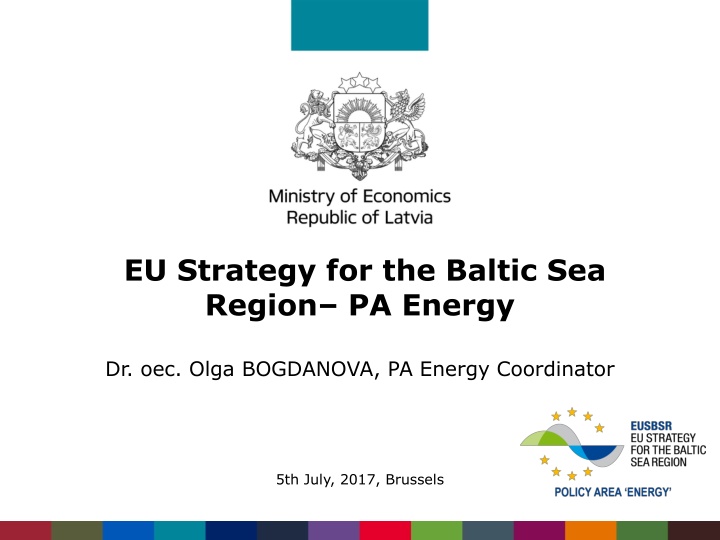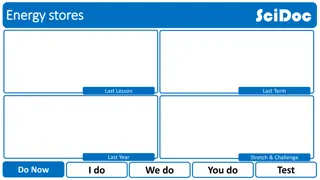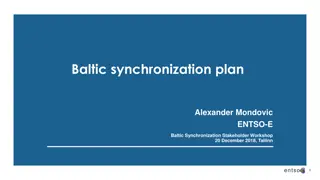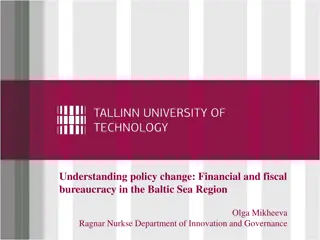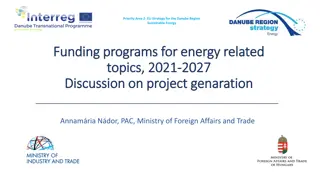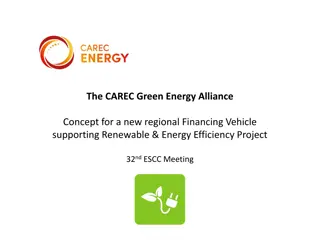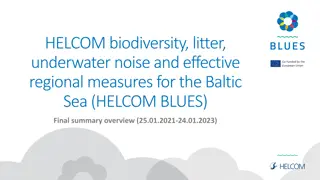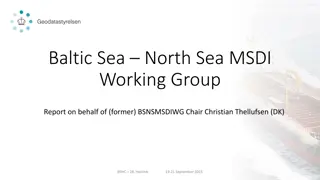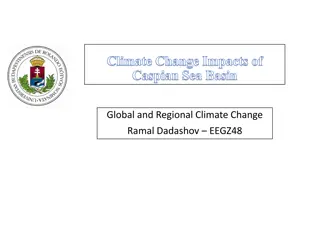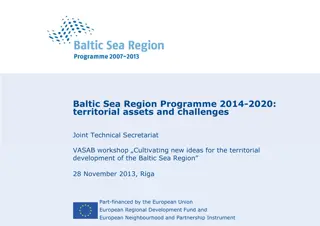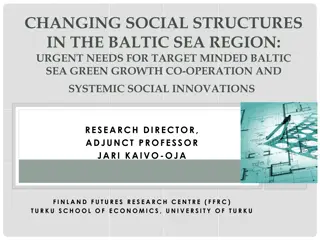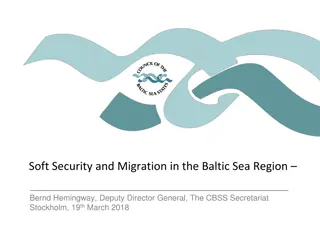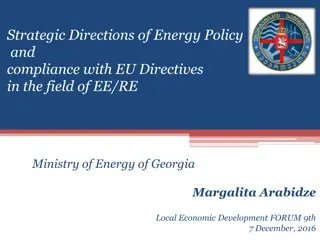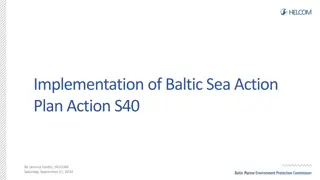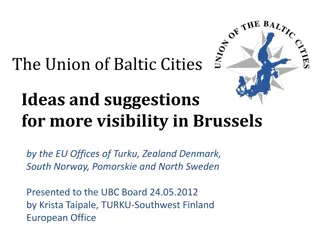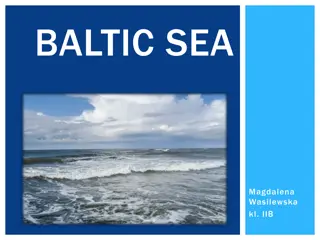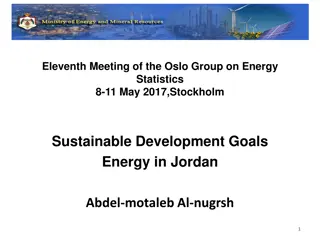EU Strategy for the Baltic Sea Region PA Energy Overview
The EU Strategy for the Baltic Sea Region focuses on enhancing regional energy cooperation and optimizing formats in Energy. Key elements include the BEMIP Joint Action Plan, promoting sustainable energy development, and enhancing energy efficiency. The Policy Area Energy reform aims to integrate the Baltic States into the EU internal electricity market, promote renewable energy sources, and support fuel switching for heating. Flagship projects play a crucial role in reaching regional targets and enhancing policy impact.
Download Presentation

Please find below an Image/Link to download the presentation.
The content on the website is provided AS IS for your information and personal use only. It may not be sold, licensed, or shared on other websites without obtaining consent from the author.If you encounter any issues during the download, it is possible that the publisher has removed the file from their server.
You are allowed to download the files provided on this website for personal or commercial use, subject to the condition that they are used lawfully. All files are the property of their respective owners.
The content on the website is provided AS IS for your information and personal use only. It may not be sold, licensed, or shared on other websites without obtaining consent from the author.
E N D
Presentation Transcript
EU Strategy for the Baltic Sea Region PA Energy Dr. oec. Olga BOGDANOVA, PA Energy Coordinator 5th July, 2017, Brussels
BEMIP/ EUSBSR: Policy Area Energy Reform of optimising regional cooperation formats in Energy: June2015 Memorandum of Understanding on the Reinforced Baltic Energy Market Interconnection Plan 'BEMIP Joint Action Plan for BEMIP and EU Strategy for the Baltic Sea Region (EUSBSR) EUSBSR documents: Action Plan and Flagship Annex
PA Energy coordination PA Energy coordinators LV<: Ministry of Economics of Latvia Ministry of Foreign Affairs together with Ministry of Energy of the Republic of Lithuania PA Energy coordinators work closely with the BEMIP group members and BEMIP HLG BEMIP group acting as the Steering committee of the EUSBSR PA Energy
BEMIP/EUSBSR PA Energy objectives in the action plan Better interconnected electricity market; Level playing field for market participants; Baltic States integrated to the EU internal electricity market; Interconnected gas grid; Fuel switching in heating/ Increased use of Renewable Energy Sources (RES) in heating; Promotion of the development of sustainable energy; Promotion of energy efficiency (EE).
Flagship projects and their purpose Projects that help to reach the EU and regionally set targets: Has a clear macro-regional dimension (at least 3 BSR countries involved) Is mature for implementation Policy impact Types of Flagships in the EUSBSR One project Project chain A process 6
Process of receiving Flagship staturs 3. BEMIP group members National Coordinators DG Regio 2. 4. 1. PA Energy coordinator (LT) PA Energy coordinator (LV) 7
Projects receiving PA Energy support when applying for funding Seed Money Projects Regular Projects 2016/2017 Year 2015 2016/2017 Projects applied to PA Energy for support 7 5 10 Projects supported by the PA Energy 2 3 6 Projects Financed by Interreg BSR 1 1 2
CURRENT FLAGSHIPS 1. BALTICINTEGRID - Integrated Baltic offshore wind electricity grid development 2. USE-LBM-BioPro - Use of liquefied biogas from waste (LBM) as gasoline substitute including side product utilization for Biopolymer production 3. EFFECT4buildings - Effective Financing Tools for implementing Energy Efficiency in Buildings 4. ACT NOW - Action for Energy Efficiency in Baltic Cities 5. BALTFLEX - Development of flexibility services for energy market 6. CO-ENERGY - Establishment and operation of cooperatives to generate energy 7. COPREMM - Conceiving and Piloting Resources Efficiency Management Measures for carbon-free heating in rural BSR communities 8. URBAN BIOGAS HUBS - Enhancing the use of biogas for urban transport 9
CURRENT FLAGSHIP 1. BALTICINTEGRID - Integrated Baltic offshore wind electricity grid development The aim of the project is to contribute to sustainable local electricity generation, further integration of the regional electricity market and enhancing security of supply around the Baltic Sea. The Baltic InteGrid will provide a professional network for expertise exchange and interdisciplinary research on the optimization potential of offshore wind energy in the Baltic Sea region. The project is a step towards the creation of a fully interconnected and integrated regional energy marked. Lead Partner: Germany. Project partners: Poland, Germany, Denmark, Sweden, Latvia, Finland, Estonia, Lithuania. Estimated duration and deadline: 2016-2019. 1 0
CURRENT FLAGSHIP 2. USE-LBM-BioPro - Use of liquefied biogas from waste (LBM) as gasoline substitute including side product utilization for Biopolymer production. The project aim is to use various types of bio-waste liquid (LBM) as fuel in private, public and professional transportation that would decrease the greenhouse gas emissions and increase the use of renewable energy. The project is focused at improving the circular economy through reusing bio-waste as a basis for new products. Lead Partner: Estonia. Project partners: Germany, Finland. Estimated duration and deadline: February 2016 September 2016. 11
CURRENT FLAGSHIP 3. EFFECT4buildings - Effective Financing Tools for implementing Energy Efficiency in Buildings The aims are: developing and improving institutional and financial measures, promoting energy efficient technological solutions to increase energy efficiency in buildings, developing and implementing training schemes for professionals and anchoring them in the daily practice of the target group. Lead Partner: Sweden. Project partners: Finland, Norway, Latvia, Denmark, Estonia, Poland. Estimated duration: 36 months. 1 2
CURRENT FLAGSHIP 4. ACT NOW - Action for Energy Efficiency in Baltic Cities The objective is to increase energy efficiency based on enhanced capacity of public and private actors involved in energy planning. The project will show how local Sustainable Energy Action Plans (SEAPs) can be turned to concrete measures reducing energy consumption in buildings. . The project focusses on strengthening the capacities of municipalities in the field of energy management, definition and funding of investment projects and addressing private investors like housing companies or landlords to stimulate their investments in energy efficiency. Lead Partner: Germany Project partners: Germany, Sweden, Poland, Finland, Denmark, Lithuania, Latvia, Estonia Estimated duration: 36 months. 13
CURRENT FLAGSHIP 5. BALTFLEX - Development of flexibility services for energy market The project's goal is to tackle the electricity flexibility market development issues regionally and to create an effectively operating energy market with flexibility services. Through creating a report with description of regional market design for flexibility services and implementing 1-3 ICT pilot projects on flexibility services project partners seek: to build up institutionalized competence of stakeholders and thus creating a basis for development of appropriate regulatory framework for flexibility services; to create a technical (IT) solution for flexibility services in Baltic-Nordic region and thus enable more efficient use of human and technical resources. knowledge and Lead Partner: Estonia. Project partners: Latvia, Lithuania, Finland. Estimated duration: 36 months. 1 4
CURRENT FLAGSHIP 6. cooperatives to generate energy Main project goals: - implementation of best practices for energy co-operatives; - setup of 12-15 power generating co-operatives by 90 SMEs; - completion of at least one pilot co-operative; - setup of regional power innovation clusters and development of regional strategies; - tested trainings and concepts of counselling. The project will contribute to bridging the gap between regional pioneers, t.i., Denmark, Finland and to some extent in Germany, and other BSR countries. CO-ENERGY - Establishment and operation of Lead Partner: Germany Project partners: Poland, Lithuania, Latvia, Finland, Denmark, Germany. Estimated duration: 36 months. 1 5
CURRENT FLAGSHIP 7. Efficiency Management Measures for carbon free heating in rural BSR communities The project promotes a more efficient use of climate-friendly resources by sharing best practices and testing adequate heating technologies. It focuses on administrative bodies of small rural municipalities which intend to develop emission neutral regions. Experienced municipalities will form a group of coaches which will be established as Baltic Sea Region competence center and train also future local coaches. COPREMM - Conceiving and Piloting Resources Lead Partner: Germany Project partners: Germany, Denmark, Finland, Latvia, Poland. Estimated duration: 36 months. 1 6
CURRENT FLAGSHIP 8. URBAN BIOGAS HUBS - Enhancing the use of biogas for urban transport The project aims to demonstrate for politicians and private sector directors that biogas is a competitive alternative from the financial, environment, climate and health aspects with the benefit of local/regional fuel supply and production. The project focuses on developing the security of fuel supply and regional substrates collection capacity; researching the relative economic and environmental performance of modern biogas buses as compared to traditional diesel and other fuel buses; as well as elaborating and implementing solution-wide holistic business models, that include an innovative approach to green public procurement and financial setup. The project will address a technology that reduces external costs, including mitigation and adaptation to climate change, in the areas of freight and/or passenger transport. Lead Partner: Sweden Project partners: Sweden, Poland, Estonia, Denmark, Finland Estimated duration: 36 months. 17
EUSBSR Annual fora Since 2010 a yearly forum has been organised to support the EUSBSR. Participants from governments, international organisations, NGOs, universities, local and regional administrations and business discussed a broad range of issues relevant for the Baltic Sea Region. EUSBSR 9th Annual Forum is planned in Tallinn, Estonia on 4-5 June 2018 in Kultuurikatel. Main theme: After 2020- EUSBSR and future of EU policies especially cohesion policy, funds and programmes
Thank you! Ministry of Economics of the Republic of Latvia Address: Br v bas iela 55, R ga, LV-1519, Latvia Phone: +371 67013100 Fax: +371 67280882 E-mail: pasts@em.gov.lv Home page: www.em.gov.lv Twitter: @EM_gov_lv, @siltinam Youtube: http://www.youtube.com/ekonomikasministrija Facebook: http://www.facebook.com/atbalstsuznemejiem
